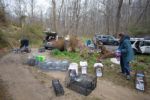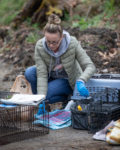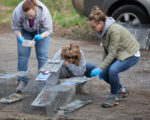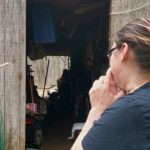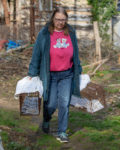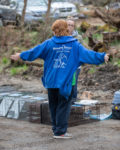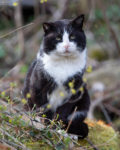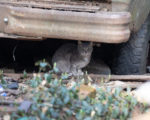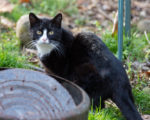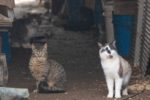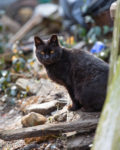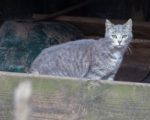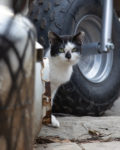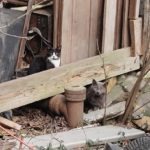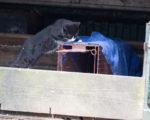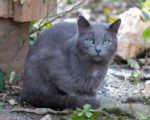By Kathleen Silver
“Community Cats” is a term used to describe outdoor, unowned, free-roaming cats. In this article, you’ll learn why running the HSLC Community Cats program takes a dedicated village of everyday heroes. But first, let’s dispel a few of the misconceptions about community cats and then introduce you to one of those heroes.
“Outdoor cats live horrible lives!”
Accidents, abuse, and disease affect outdoor cats living alone or in groups. But, feral cats are generally not adoptable and simply cannot live inside. HSLC’s Community Cats program improves the lives of these cats in so many ways through trap, neuter, and return (TNR). TNR also serves to humanely stabilize cat populations. In addition, HSLC community cat caretakers ensure that the cat colonies in our care are fed and watered every day; plus they keep an eye out for any health issues.
“I need special skills to help trap cats.”
Volunteers who help manage feral cat communities are genuinely silent heroes. But, they don’t require special skills. Rather, they simply need to be patient and dedicated. It also helps if the volunteers appreciate the outdoors regardless of the season.
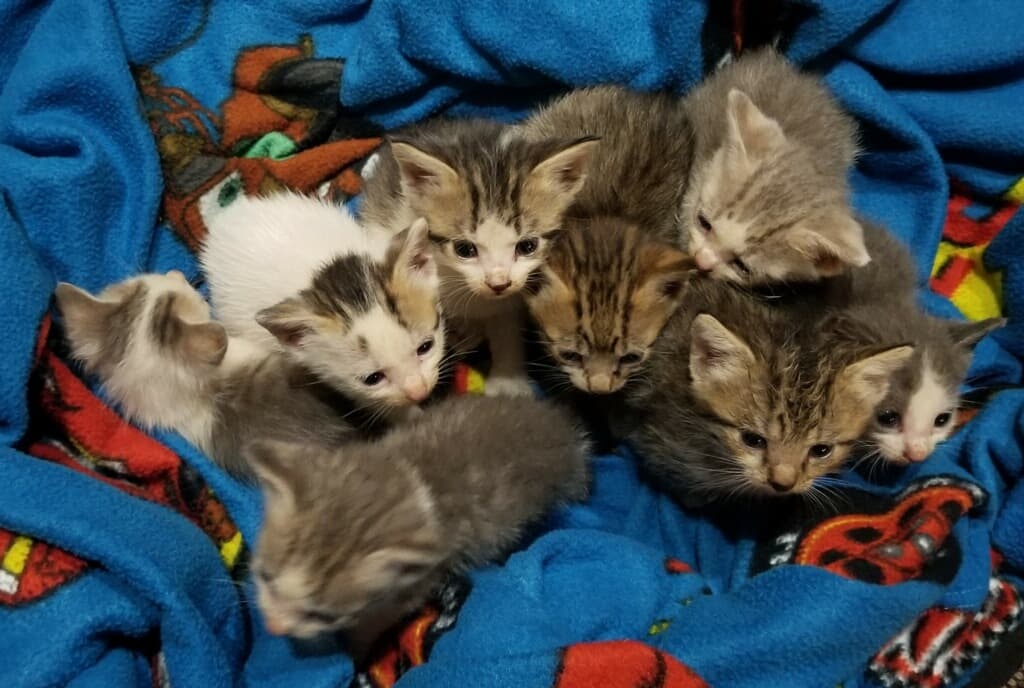
“Born a feral cat, always a feral cat.”
While this is usually true of adult feral cats, it is not necessarily true of kittens. Once a feral cat gives birth, the kittens can usually be socialized and adopted through normal means. There are anecdotal stories of adult cats becoming socialized. But, in most cases, these cats had been socialized before their outdoor life.
Everyday Hero: Dora Lea
Dora Lea Spring-Lucas is one of our Community Cat heroes; in fact, she’s a seasoned veteran. She can attest to the benefits of these bonded cat communities with nearly 30 years of experience helping feral cats. Volunteers like Dora Lea, help to manage over 20 community cat sites in Loudoun County.
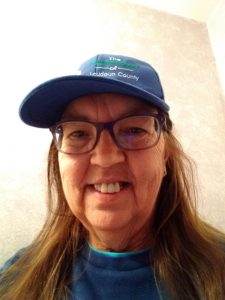
When asked what her biggest challenge is, Dora Lea didn’t have to consider the question too long. “People dropping tame (domesticated) cats. I do feel for people who might be embarrassed about surrendering their cats directly to the Humane Society, but they shouldn’t feel that way. For us to contain these feral colonies, we need to keep the populations down.” If you, or someone you know, adopted from HSLC and are considering surrendering your animal, please contact us at helpanimals@humaneloudoun.org.
Two Ways You Can Help
Community Cat Caretaker looks after a feral cat colony’s health and well-being regularly (e.g. each Monday). The caretaker provides cat food and water and notifies the lead volunteer when a cat is sick. HSLC provides on-site training. If you have an eye for detail, this could be the role for you.
Trapper: Trappers help community cats by catching them in humane traps (provided by HSLC) and helping to get them to our vet partners to be neutered, vaccinated, and microchipped. We provide on-the-job training and shadowing until new trappers are comfortable working independently. Most trappers work in pairs or groups.
Committing to volunteer as a trapper can be time-consuming as there is a lot of waiting around for timid cats and kittens to walk into traps. But, Dora Lea says the satisfaction and reward can be significant. Every trap that closes contains a life filled with less stress, disease, and abuse.
Apply to be an everyday hero today!
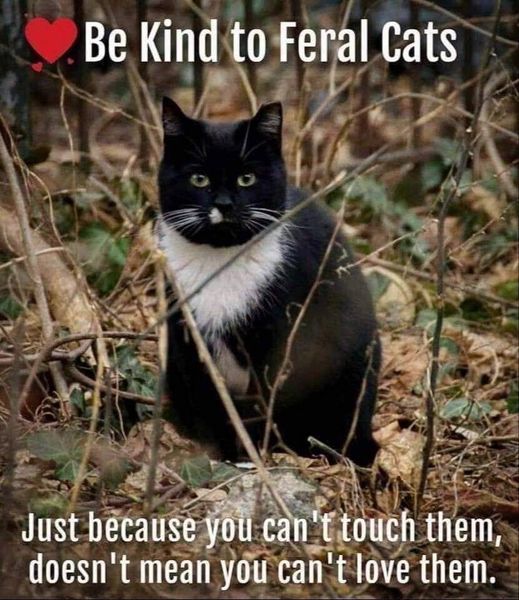
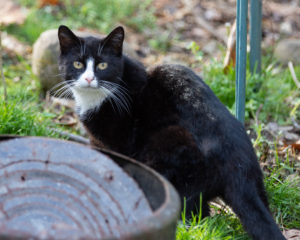
“Never doubt that a small group of thoughtful, committed citizens can change the world.
Indeed, it is the only thing that ever has.”
~Margaret Mead
It takes a dedicated team of volunteers to make our Community Cats program a success. Over the past week, our amazing TNR (Trap-Neuter-Return) volunteers have been working to help a gentleman who had become overwhelmed with what we all thought were about 40 unfixed cats on his property. He didn’t know where to turn for help until someone referred him to the Humane Society of Loudoun County (HSLC).
Our goal was to humanely trap the community cats and have them microchipped, vaccinated and neutered to stabilize the population and stop the proliferation of feral kittens. Unchecked, the population of this colony would have expanded exponentially very, very quickly.
Timeline to Date
Sunday, April 7 – Over a dozen intrepid volunteers spent about 10 long hours trapping 35 community cats. Our team worked together to set and place the traps, organize the cats, label the traps and get the paperwork ready for their surgery (spay or neuter) the next day.
Tuesday, April 9 – We returned most of the cats to the site and our volunteers trapped more cats while they were there.
Friday, April 12 – We returned the second group of cats and trapped additional cats as well.
To date, we have trapped 51 community cats at this site, with several more left to get. We also think there are at least three litters of kittens born within the past week that we will try to find and trap when they are about five weeks or so old, along with the moms.
By the time we are finished, we will have helped 60-70 cats and kittens at this one site. This is the biggest site at which HSLC has ever performed a TNR operation. We are so grateful to our great team of volunteers without whom we never would have been able to get so many cats so quickly. Thanks to them, the kittens from this colony will find safe, loving forever homes and the community cats returned to the site will live longer and healthier lives.
Please check out our photo galleries below compliments of Marty McKee and Julia Grosz (aka the Cat Hustler). Click on the photos to enlarge them. And, be sure to scroll to the end to learn how you can help control the pet population in Loudoun County.
TNR Operation
Community Cats
How You Can Help
- Donate: The price-tag for neutering, vaccinating and microchipping dozens of community cats is literally in the thousands. Each donation adds up and is greatly appreciated.
- Kitten Care: Just like human babies, kittens require a lot of food and supplies. Visit our amazon.com wish list for a current list of needed items.
- Spay/Neuter: Encourage friends, family and neighbors to spay/neuter their pets. There are many low-cost Spay/Neuter options available in Loudoun County and in communities all across the country.
- Foster: Since HSLC has no physical shelter, we rely on individuals to open their hearts and homes to at-risk animals. Our foster program has the most direct impact of saving lives of any of our programs.
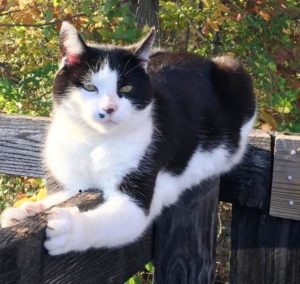
Humane Loudoun’s “Critter Control” program is a form of organic pest control that can help keep rodents away from grain, food storage, etc. They are a cleaner, more effective alternative than dangerous pesticides and they are on duty 24/7. The adopting local businesses will enjoy their company from afar as well as having the satisfaction of giving them a much-needed home. If you currently have unspayed barn cats, you can also receive assistance in having them sterilized.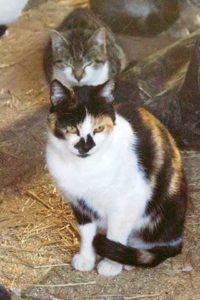
Humane Society of Loudoun County is an all-volunteer, no-kill, registered non-profit 501(c)(3) organization. If you own or manage property like those previously mentioned, and have permission for long-term placement of animals on the property, please contact the Humane Society of Loudoun County at helpanimals@humaneloudoun.org. For more information visit our website.
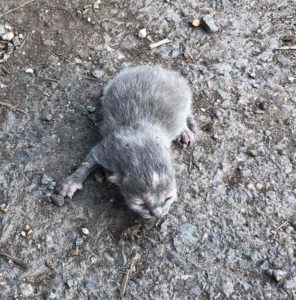
Considering the site closed, imagine our surprise when a few days old kitten was found on the grounds yesterday, with no sign of mama or any other cats anywhere.
So our contact there reached out to us for help. Our TNR Coordinator, Donna, immediately started networking to find a place to put the kitten in order to save its life. Normally we try to keep kittens with mom til they are old enough but we couldn’t in this case since we couldn’t find her.
Donna reached out to Marnie Russ, who runs the kitten nursery at the Animal Welfare League of Arlington. She is also one of founders of National Kitten Coalition. Fortunately one of our volunteers and fosters, Molly Boyne, also fosters for them too and currently has a nursing mom. So Marnie and Donna felt placing the kitten with Molly would be our best option. 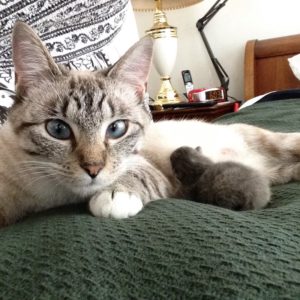
The nursing mom foster, Snowflake, accepted the kitten and she was able to nurse for a while and fill her belly, which probably saved her life. But Snowflake is an inconsistent feeder and needs a human to remind her to feed the kitten. So we decided it would be best to move the kitten to another AWLA foster that lives nearby and is already bottle feeding a couple of young kittens. The next best option if a nursing mom isn’t available is to place a solitary kitten with other similar kittens to increase the chance of survival.
Last we heard the kitten is doing okay. Thank you to all involved for helping to save this little life.
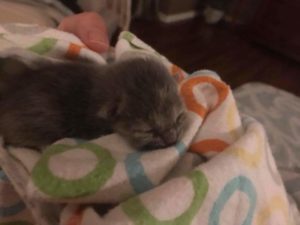
Our TNR program is only possible because of caring friends like you. Please make more rescues like this possible by making a tax-deductible donation today. Thank you!
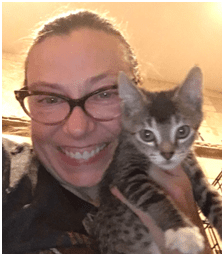
HSLC works to control community cat populations in Loudoun County through its Trap-Neuter-Release (TNR) program. Sharon Nylec has been a volunteer supporting the TNR program since 2004 and talked to us about her experience.
What activities do you support at the Human Society of Loudoun County?
I am active in the TNR program, I am also active in our Loudoun Working Cats program that places community cats with individuals, businesses, or farms that have a rodent problem. And last, but not least, I am a foster. Right now I have a mom cat with five babies, and a teenager kitten.
When did you first get involved and what prompted you to volunteer?
I first got involved with community cats when I started my job as a medical technologist at Inova Loudou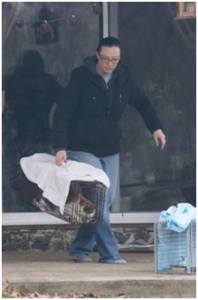 n Hospital in 1998. There were a bunch of resident cats roaming around our back, having litter, after litter, after litter. Every so often the plant operations engineers would load up a box with kittens and ask the hospital employees to adopt them. I adopted one, then another, and finally said this reproduction cycle has GOT to stop. I am at my limit of two cats!!! Of course, that two cat limit is a joke right now!
n Hospital in 1998. There were a bunch of resident cats roaming around our back, having litter, after litter, after litter. Every so often the plant operations engineers would load up a box with kittens and ask the hospital employees to adopt them. I adopted one, then another, and finally said this reproduction cycle has GOT to stop. I am at my limit of two cats!!! Of course, that two cat limit is a joke right now!
Anyway, I started doing some research with the local animal rescue groups and Alley Cat Allies, and found out about their Trap Neuter Return program. They sent someone out to help, and I was fascinated with the process. I asked them to teach me how to do it so I could manage the hospital colony, and the rest is history. We went from 20 cats in 1998 to placing our very last kitty in a home in 2016. There aren’t any more cats at the hospital, so as you can see-TNR takes time, but it works!!
After the hospital cats were trapped I looked for a group more local than Alley Cat Allies that had a TNR program, and the Humane Society of Loudoun County (HSLC) was that group.
What do you most enjoy about your volunteer work?
I love working with people who adore their outdoor cats and want to make their lives better and more comfortable. I also like working with hissy, spitty feral kittens and showing them how great human company can be.
What are the challenges/rewards?
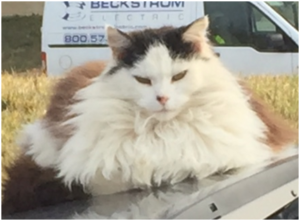 There are so many challenges…working with HSLC is a passion of mine, but I also have a job, my own family, and my pets. Trying to find that perfect balance, trying to make it all fit in takes a lot of effort. I truly wish there were more hours in the day so I could squeeze more work in.
There are so many challenges…working with HSLC is a passion of mine, but I also have a job, my own family, and my pets. Trying to find that perfect balance, trying to make it all fit in takes a lot of effort. I truly wish there were more hours in the day so I could squeeze more work in.
Trapping community cats takes a lot of patience and perseverance, too. We have to work with the cats’ schedule, so a lot of times we are out late at night in sketchy neighborhoods or up really early when we could be sleeping in. If it’s a huge cat colony, it can take up to two years to complete it. Some cats are so smart, they learn what a trap is and avoid it. You have to really think outside the box trap to get them!
You also asked about rewards. Oh my, the euphoria you feel when you finally get that last smartypants mommy cat…it’s a rush! Totally worth all the time and effort I put in, just to get that feeling when the trap door closes on the last cat and you can officially say the site is done!! One colony I did had over 50 cats. It took me over two years and we pulled and placed 25 or more kittens. We are still actively caring for that colony because they are too much for the current property owner to handle, but at least they are done! No more babies!
I must also mention another rewarding aspect regarding a different program with HSLC. The foster program gives you all the “feels.” I feel good rescuing kittens from their hard lives outdoors, and I feel good pulling tame, beautiful cats out of high kill shelters. I’ve had many litters of sick kittens that got better because HSLC sponsored their vet care, and it is a thrill when they are finally healthy and get adopted. Honestly, there is nothing better than knowing you made a difference and you saved a life.
What should people do if they see a feral cat?
First of all, is it truly feral? There is a difference between a domesticated stray and true feral. Strays are usually vocal, and may allow you to approach. A true feral would like you to mind your own business and they will just go on about their day, thank you very much. They are furtive, occasionally defensive, and hardly ever vocalize. Regardless of feral or stray, put out a bowl of food for them the same time every day and fill out our TNR request on line at https://humaneloudoun.org/tnr-application/
We will answer your requests and come to assess the cats. If it is indeed a stray, we try to find the owner. If we can’t find the owner or it is feral, we take them to the vet to be spayed, vaccinated, treated for parasites and microchipped to identify their location. It’s an EXCELLENT program! By the way, we take care of the community cats regardless of the caretaker’s ability to pay, but if someone has the means, we do like to mention they can ‘Spay it forward‘.
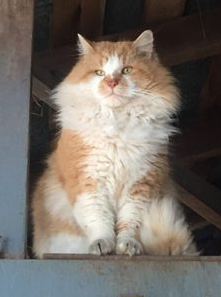
THERE IS NO CHARGE FOR THIS SERVICE.
TNR is a core component of the No Kill Equation and helps reduce the overpopulation of community (feral) cats. We don’t want anyone to be afraid to ask for help because they can’t handle the financial burden of vaccinating and neutering multiple cats.
If you need help with Community Cats, you can fill out a TNR request form HERE
We also have a Working Cats program to relocate cats that are in danger to new homes in barns, wineries, breweries, greenhouses, sheds, garages or other suitable places. OUR WORKING CATS PROGRAM IS ALSO FREE OF CHARGE.
To fill out a request for Working Cats, fill out an application HERE
If you’d like to volunteer to help our TNR or Working Cats programs by Trapping, Transporting, helping our various Colony Caretakers, or to help get Working cats relocated, email us at helpanimals@humaneloudoun.org.


